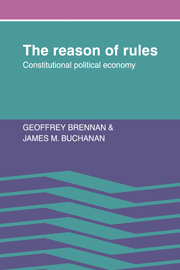Book contents
- Frontmatter
- Contents
- Preface
- 1 The constitutional imperative
- 2 The contractarian vision
- 3 The myth of benevolence
- 4 Modeling the individual for constitutional analysis
- 5 Time temptation, and the constrained future
- 6 Politics without rules, I: Time and nonconstrained collective action
- 7 Rules and justice
- 8 Politics without rules, II: Distributive justice and distributive politics
- 9 Is constitutional revolution possible in democracy?
- Index
8 - Politics without rules, II: Distributive justice and distributive politics
Published online by Cambridge University Press: 05 November 2011
- Frontmatter
- Contents
- Preface
- 1 The constitutional imperative
- 2 The contractarian vision
- 3 The myth of benevolence
- 4 Modeling the individual for constitutional analysis
- 5 Time temptation, and the constrained future
- 6 Politics without rules, I: Time and nonconstrained collective action
- 7 Rules and justice
- 8 Politics without rules, II: Distributive justice and distributive politics
- 9 Is constitutional revolution possible in democracy?
- Index
Summary
Introduction
In Chapter 7 we discussed the connection between rules and justice. We argued that a meaningful discussion of justice presupposes the existence of rules and that a just outcome emerges when the relevant rules have been followed.
Such a view of justice is not common, in either economic or broader circles. Orthodox conceptions of justice invoke the notion of distributive justice, or “equity.” In this view, the justice or injustice of an outcome is held to be an intrinsic property of the outcome itself and to be context independent. To determine whether one social outcome is more “just” than another, one need merely investigate the relative positions of individuals in each. Relative positions are typically measured by reference to individuals' incomes or wealth, although sometimes consumption of, or access to, certain “crucial” consumption items (e.g., health, housing, food, or education) can be regarded as a superior basis for comparison.
It is not our objective here to criticize this familiar conception of distributive justice; in what follows, we shall take the normative relevance of “equality,” or “less inequality,”somehow construed, as given. Our concern is, rather, to examine the concept of distributive justice from the constitutional perspective. Our task is to ask, given the normative judgment that equality is desirable, what set of institutional arrangements are likely to be most conductive to securing that “equality”(or “less inequality”).
- Type
- Chapter
- Information
- The Reason of RulesConstitutional Political Economy, pp. 112 - 133Publisher: Cambridge University PressPrint publication year: 1986



